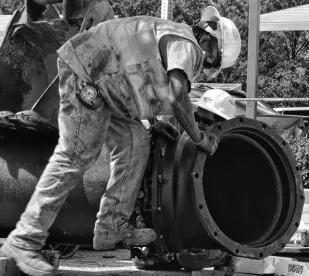PHMSA terminates Stay of Enforcement and Notice of Enforcement Discretion related to COVID-19. PHMSA convenes public meeting on natural gas pipeline leak detection and repair. DOT increases maximum civil penalties for pipeline safety violations. DOT removes guidance and enforcement procedures and streamlines rulemaking procedures. DOT initiates review of regulations. PHMSA revises proposed information collections for the Gas Transmission and Gathering Annual Report and Incident Report Forms and the Annual Report Form for underground natural gas storage facilities. Status of PHMSA Rulemakings. PHMSA publishes correction to Gas Pipeline Regulatory Reform final rule. TSA seeks comments on proposal to continue collecting of critical pipeline facility security information. Pipeline Association for Public Awareness issues 2021 Excavation Safety Guide.
PHMSA Terminates Stay of Enforcement and Notice of Enforcement Discretion Related to COVID-19
On May 19, the Pipeline and Hazardous Materials Safety Administration (PHMSA) issued a Notice of Termination stating that, effective May 26, the agency is terminating the Stay of Enforcement and Notice of Enforcement Discretion that was issued on March 20, 2020. The March 2020 Notice advised operators of gas and hazardous liquid pipelines, underground natural gas storage, and liquefied natural gas (LNG) facilities affected by the National Emergency Relating to the Novel Coronavirus Disease (COVID-19) Outbreak that PHMSA did not intend to take enforcement action with respect to certain operator qualification and control room management requirements in parts 192, 193 and 195 of the federal pipeline safety regulations. In addition, PHMSA stated that it would consider exercising enforcement discretion with respect to part 199 drug testing requirements. The 2020 Notice also advised that PHMSA would not object to similar measures adopted by state authorities with respect to state-regulated intrastate pipeline facilities in response to the COVID-19 National Emergency.
In the Notice of Termination, PHMSA concludes that, given recent events, including the development and distribution of COVID-19 vaccines, the lifting of certain COVID-19 related restrictions, and the decreased number of notifications from pipeline operators of the need for the flexibility contained in the March 2020 Notice, the Stay of Enforcement and Notice of Enforcement Discretion can be terminated safely. PHMSA explains that beginning on May 26, the March 2020 Notice will no longer serve as the basis for any exercise of enforcement discretion for any noncompliance or notification of noncompliance that occurs after that date.
PHMSA Convenes Public Meeting on Natural Gas Pipeline Leak Detection and Repair
On May 5-6, PHMSA convened a public meeting to address leak detection and repair on natural gas pipelines and the agency’s priorities under the Protecting our Infrastructure of Pipelines and Enhancing Safety (PIPES) Act of 2020. This public meeting will inform the regulations that PHMSA has been directed to develop under section 113 of the 2020 PIPES Act requiring natural gas pipeline operators to implement leak detection and repair programs. Presentations from the meeting are here. A transcript also will become available.
During the meeting, PHMSA officials, including Acting Administrator Tristan Brown and Associate Administrator for Pipeline Safety Alan Mayberry highlighted PHMSA’s twin goals of ensuring pipeline safety and protecting the environment. To this end, they emphasized the importance of reducing all methane emissions (intentional and unintentional).
In addition, the Acting Administrator stated that PHMSA is preparing an advisory bulletin to provide guidance with respect to compliance with section 114 of the 2020 PIPES Act which requires that natural gas pipeline operators ensure that their maintenance and inspection plans address the elimination of hazardous leaks, minimization of natural gas releases, and the replacement or remediation of pipelines known to leak based on pipeline characteristics and operating history. Compliance with this self-executing section of the statute is required by December 27, 2021, and PHMSA stated that enforcement of this provision will be “aggressive.”
DOT Increases Maximum Civil Penalties for Pipeline Safety Violations
On May 3, the Department of Transportation (DOT) issued a final rule increasing the maximum civil penalties that PHMSA may assess for violations of the federal Pipeline Safety Laws to reflect the 2021 inflation adjustment. Effective May 3, the maximum civil penalty for each pipeline safety violation increased from $222,504 to $225,134 per violation per day, and the maximum penalty for a related series of pipeline safety violations increased from $2,225,034 to $2,251,334. The maximum additional penalty for LNG pipeline safety violations increased from $81,284 to $82,245. These increased penalties apply only to violations occurring after the effective date.
DOT Removes Guidance and Enforcement Procedures and Amends Rulemaking Procedures
On April 2, DOT issued a Final Rule amending the agency’s Administrative Rulemaking, Guidance and Enforcement Procedures (Title 49, part 5), in particular, revising Rulemaking Procedures and removing Guidance Procedures and Enforcement Procedures. These procedures apply to DOT’s operating administrations (OA), including PHMSA. The final rule became effective May 3, 2021.
DOT stated that many of the policies and procedures were removed because they implemented executive orders that have been revoked. Regulations not directly attributable to revoked executive orders were removed because they applied solely to internal agency operations or duplicated existing departmental procedures and do not need to be codified. Provisions addressing enforcement matters were removed because many are derived from the Administrative Procedure Act and court decisions and do not need to be included in the regulations to be effective. Finally, DOT stated that removing the provisions will enable the agency to efficiently issue new regulations and take other actions to support the objectives of E.O. 13990, Protecting Public Health and the Environment and Restoring Science to Tackle the Climate Crisis.
Below is a brief overview of significant changes.
Rulemaking Procedures (Subpart B): The final rule removed most of DOT’s rulemaking procedures, retaining those that allow the public to petition for rulemakings and exemptions and that address public contacts in informal rulemakings. DOT noted that, although it is revising its petition procedures to remove references to retrospective reviews and guidance documents, the agency will accept and process such petitions while it revises its petition procedures.
Guidance Procedures (Subpart C): The final rule removed provisions that, among other things, had required that guidance documents proposed by a DOT OA, such as PHMSA, be reviewed and cleared by the OA’s Office of Chief Counsel and that proposed guidance deemed to be a “significant guidance document” be subject to informal notice and comment procedures. The final rule also removes the requirement that each OA publicly post all effective guidance documents on its website in a single, searchable, indexed database.
Enforcement Procedures (Subpart D): The final rule removed enforcement procedures which, among other things, described DOT’s general enforcement policy; the responsibilities of enforcement attorneys; various due process principles such as fair notice, the separation of functions, the prohibition of bias, and the OAs’ duty to disclose exculpatory evidence; and the content of the hearing record.
DOT Begins Review of Regulations
On May 5, DOT issued a Notification of Regulatory Review stating that the agency is conducting a review of its existing regulations and “other agency actions” to determine if they are consistent with the policies and objectives described in E.O. 13990, Protecting Public Health and the Environment and Restoring Science to Tackle the Climate Crisis, and E.O. 13992, Revocation of Certain Executive Orders Concerning Federal Regulation.
E.O. 13990 sets forth the Administration’s policy to “listen to the science; to improve public health and protect our environment; to ensure access to clean air and water; to limit exposure to dangerous chemicals and pesticides; to hold polluters accountable, including those who disproportionately harm communities of color and low-income communities; to reduce greenhouse gas emissions; to bolster resilience to the impacts of climate change; to restore and expand our national treasures and monuments; and to prioritize both environmental justice and the creation of the well-paying union jobs necessary to deliver on these goals.”
E.O. 13992 sets forth the Administration’s policy “to use available tools to confront the urgent challenges facing the Nation, including the novel coronavirus disease 2019 (COVID–19) pandemic, economic recovery, racial justice and climate change.”
DOT invites comments on existing rules and other agency actions by June 4.
PHMSA Revises Proposed Information Collections for the Gas Transmission and Gathering Annual Report and Incident Report Forms and the Annual Report Form for Underground Natural Gas Storage Facilities.
On May 14, PHMSA issued a Notice and Request for Comments announcing the submission of three revised information collection requests to the Office of Management and Budget (OMB) for approval. The information collection requests were previously proposed on December 17, 2020 and would revise the following report forms: (1) “Annual Report for Natural and Other Gas Transmission and Gathering Pipeline Systems” (Form PHMSA F 7100.2-1) (Pipeline Annual Report Form); (2) “Underground Natural Gas Storage Facility Annual Report” (Form PHMSA F 7100.4-1) (Storage Annual Report Form); and (3) “Incident Report for Gas Transmission and Gathering Systems” (Form PHMSA F 7100.2) (Incident Report Form). The deadline for submitting comments to PHMSA is June 14.
The current Notice explains that, in response to comments received on the December 2020 Notice, PHMSA has modified instructions in Part G of the Pipeline Annual Report Form to clarify that operators are required to report baseline and reassessment data only for moderate consequence area (MCA) segments that are subject to the assessment requirements of § 192.710.
PHMSA also is withdrawing its proposal to move the reporting of the number of relief valve lifts and compressor station emergency shutdown (ESD) events from the Incident Report Form to the Pipeline Annual Report Form. PHMSA explained that the December 2020 proposal inadvertently omitted notice to the public that the Pipeline Annual Report Form would include the requirement that operators report the volume of natural gas released during these events. Consequently, the proposal would not have permitted PHMSA to continue to collect information regarding the amount of gas released from relief valve and ESD events as the agency does now in the Incident Report Form. Therefore, PHMSA withdrew this proposal to avoid a disruption in its ability to collect such data. PHMSA intends to address this issue in a future information collection amendment.
PHMSA also accepted recommended clarifications to the Underground Natural Gas Storage Facility Annual Report to separately identify the number of wells plugged and abandoned during the calendar year and to clarify that wells plugged but not abandoned do not include temporary plugs.
Status of PHMSA Rulemakings
The chart below shows the status of PHMSA’s pending pipeline safety rulemakings as reflected in PHMSA’s May 14 PIPES Act 2020 Web Chart, which is mandated in the 2020 PIPES Act, and OMB’s Office of Information and Regulatory Affairs (OIRA) Fall 2020 Unified Agenda. New information is reflected in bold.
Pending Final Rules
|
Proceeding |
PHMSA Estimated Publication |
OIRA Estimated Publication |
|
Class Location Requirements |
March 21, 2023 |
November 2020 |
|
Coastal Ecological Unusually Sensitive Areas (Changed from Advanced Notice of Proposed Rulemaking to Interim Final Rule) |
November 5, 2021 |
Listed as an ANPRM |
|
Liquid Pipeline Regulatory Reform |
Not Listed |
April 2021 |
|
Periodic Standards Update Rule (2137-AF13) |
Not Listed |
Not Provided |
|
Pipeline Rupture Detection and Mitigation for Onshore Populated and High Consequence Areas |
October 29, 2021 |
April 2021 |
|
Safety of Gas Gathering Pipelines |
November 30, 2021 |
April 2021 |
|
Safety of Gas Transmission Pipelines: Discretionary Integrity Management Improvements |
November 30, 2021 |
April 2021 |
Pending Notices of Proposed Rulemakings
|
Proceeding |
PHMSA Estimated Publication |
OIRA Estimated Publication |
|
Amendments to LNG Facilities |
September 9, 2022 |
June 2021 |
|
Gas Pipeline Leak Detection |
May 27, 2022 |
Not Listed |
|
Liquid Pipeline Regulatory Reform |
Not Listed |
April 2021 |
|
Periodic Standards Update Rule (2137-AF13) |
NPRM Issued January 15, 2021 |
|
|
Periodic Standards Update II (2137-AF48) |
Not Listed |
April 2021 |
|
Pipeline Operational Status |
April 14, 2023 |
Not Listed |
|
Repair Criteria for Hazardous Liquid Pipelines |
Not Listed |
July 2021 |
|
Safety of Gas Distribution Pipelines |
July 5, 2022 |
Not Listed |
Other Updates from PHMSA
PHMSA publishes correction to Gas Pipeline Regulatory Reform final rule. On March 5, PHMSA issued a final rule correcting the Gas Pipeline Regulatory Reform final rule issued on January 11. Among other things, PHMSA amended the language of § 192.507(d) to remove the word “hydrostatic” to recognize that a pressure test performed under this regulation (on a pipeline that operates at a hoop stress less than 30 percent of specified minimum yield strength (SMYS) and at or above 100 psig) can use a medium other than water.
Updates from Other Federal Agencies
TSA seeks comments on proposal to continue collecting critical pipeline facility security information. The Transportation Security Administration (TSA) issued a notice inviting comments on a proposed information collection request under which TSA would continue collecting facility security information from pipeline operators during site visits using the Critical Facility Security Review (CFSR) form. TSA is revising the information collection to align the CFSR with the Pipeline Security Guidelines revised in April 2018. TSA also is seeking OMB approval to continue the procedure of following up with pipeline operators via email regarding their implementation of security improvements and recommendations made during facility visits. Comments are due June 7.
Updates from Industry
Pipeline Association for Public Awareness issues 2021 Excavation Safety Guide. On March 1, Pipeline Association for Public Awareness issued the Pipeline Edition of its Excavation Safety Guide. Among other things, the 60-page Guide discusses the importance of locating private, as well as public, utilities; describes tips and guidance for locating and marking practices; addresses preventing damage to underwater pipelines; addresses worker safety; describes the hazards associated with different products transported by pipelines; provides an overview of Common Ground Alliance Best Practices and an overview of changes to state damage prevention laws.







 />i
/>i
